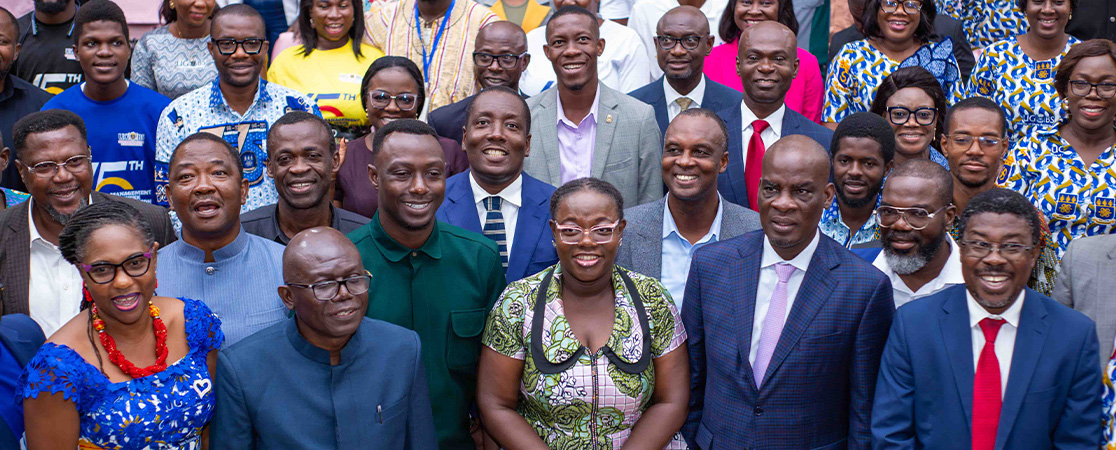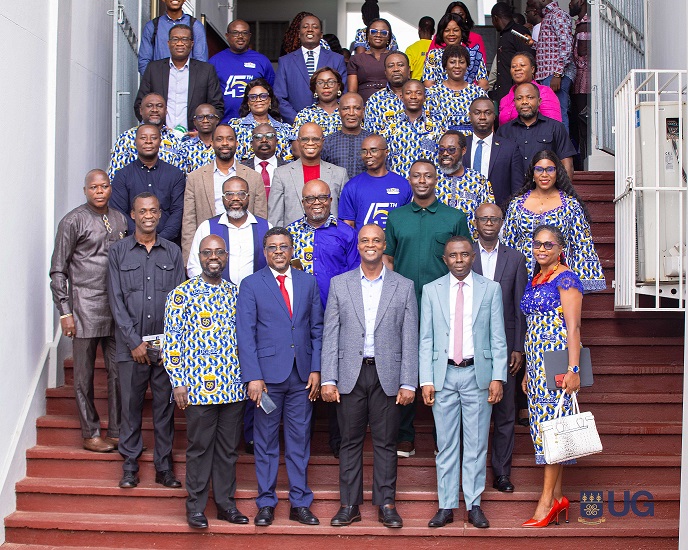
UGBS Holds Grand Durbar to Celebrate 45th Management Day
The University of Ghana Business School (UGBS) held a durbar on 16th July 2025, at the R. S. Amegashie Auditorium to commemorate the 45th edition of its annual Management Day. The event was held under the theme “Marketing Innovation and Entrepreneurship as Catalysts for Growth in a 24-Hour Economy”. The durbar was attended by a high-profile delegation led by the Honourable Minister of Education, Haruna Iddrisu, who represented the President of the Republic of Ghana, His Excellency John Dramani Mahama. Also present were the Vice-Chancellor of the University of Ghana-Prof. Nana Aba Appiah Amfo, Pro Vice-Chancellor in charge of Research, Innovation and Development-Prof. Felix Ankomah Asante, Directors, Deans, faculty, staff, students, and alumni of the Business School. The event featured keynote addresses and presentations by guest speakers Nana Opoku Agyeman-Prempeh, Co-Founder and CEO of GrowForMe, and Nii Doodo Dodoo, Country Director of the British Council for Ghana, Sierra Leone, and Cameroon.
In his welcome address, the Dean of UGBS, Prof. Justice Nyigmah Bawole, reflected on the school’s journey and its transformation over the past years. He noted that the theme challenges institutions and enterprises to adapt to the realities of a digitally driven world. For our young people to thrive, he said, “they must become innovators, not just employees, creators or consumers. Our role as a business school is to nurture this spirit, build platforms like the UGBS Nest, and work with our industry partners to turn entrepreneurial potential into real-world impact. He commended Prof. Joshua Y. Abor for his efforts in establishing the Bank of Ghana Chair in Finance and Economics at UGBS.
He outlined some of UGBS’s recent achievements, including the introduction of 15 new academic programmes tailored to meet industry demands, winning the 2024 Business Sense National Challenge; marking the first university in the Accra Region to win the contest, emerging as winners of the Chartered Global Management Accountant (CGMA) Leadership Award, implementing a digitally integrated curriculum that includes Computerised Accounting Training, distributing 100 laptops to support students in need and help bridge the digital divide, nearing completion of a five-storey ultra-modern academic building funded through internal generated funds, installation of smart boards and modern facilities, training over 350 entrepreneurs through the UGBS Innovation and Incubation Hub; supporting more than 30 startup ventures in commercialisation and digital payments, receiving international recognition, Fihankra ComTech Ltd; student-led enterprise from the UGBS Nest, which won the African Youth in Tourism Innovation Challenge held in Botswana.
He also noted that UGBS now has active exchange agreements with 32 renowned business schools globally, enabling students to study abroad tuition-free. Additionally, partnerships with Axis Pension Scheme have enabled 60 students to receive sponsorship and supported 50 UG staff to enrol in UGBS programmes at no cost. The Dean also highlighted the school’s social responsibility initiatives, including donations to the Demonstration School for the Deaf (with Deafblind Unit) at Mampong- Akuapem in the Eastern Region of Ghana, the Accra Psychiatric Hospital, and Akosombo Dam Spillage Victims of Mepe in the Volta Region. He concluded by acknowledging the faculty, staff, students, and university leadership for their role in advancing UGBS’s mission. “The purpose of UGBS is not merely to train job seekers but to shape transformational leaders who are ethically enterprising and globally minded,” he declared.
The Vice-Chancellor of the University of Ghana, Prof. Nana Aba Appiah Amfo, praised UGBS for choosing a timely and forward-looking theme. She remarked that the school is already functioning within the spirit of the 24-hour economy due to its full range of regular, weekend, evening, and online programmes. She commended the Dean, faculty, administrators, students, and alumni for sustaining the Management Day tradition over four decades, and for maintaining UGBS’s relevance in bridging academia, industry, and policy. Touching on the demands of a modern economy, she emphasised that “in an era marked by rapid technological advancement, shifting consumer behaviour, and evolving market dynamics, innovation is no longer optional; it is essential.” She encouraged the audience to rethink how higher education can drive marketing innovation, entrepreneurship, and inclusive economic growth in Ghana and beyond.
Representing H.E. John Dramani Mahama, Hon. Haruna Iddrisu delivered a keynote address that resonated with both nostalgia and vision. Reflecting on his student leadership journey, he encouraged the youth to embrace ethics and integrity in leadership, noting that today’s students are tomorrow’s national leaders. He lauded UGBS for aligning its theme with the President’s recently launched 24-Hour Economy Policy, which aims to reform how Ghanaians work, produce, and consume. “The 24-hour economy is not just about staying awake; it’s about rethinking productivity,” he said. “We must create an enabling environment for the private sector to thrive round-the-clock.”
He outlined the need for robust policy support, human capital development, and entrepreneurship to power the 24-hour economy and called on educational institutions like UGBS to lead the charge. He also praised the Vice-Chancellor for digitisation efforts that have expanded youth access to technology and skills development. Hon. Iddrisu reaffirmed government support for the University of Ghana, referencing the recent reintegration of the University of Ghana Medical Centre (UGMC) into UG’s administrative control as part of President Mahama’s fulfilled campaign promise.

Nana Opoku Agyeman-Prempeh, Co-Founder and CEO of GrowForMe, delivered a presentation on Digital Disruption and Entrepreneurial Agility in the 24-Hour Economy with Emphasis on Agriculture. He defined digital disruption as the merging of new technologies and business models to create more efficient, scalable services. Drawing from his work at GrowForMe, he illustrated how digital platforms now allow Ghanaians and Africans in the diaspora to invest in agriculture in real-time, supporting smallholder farmers with mechanisation, market access, and financial returns.
He cited strategic partnerships with MTN Ghana and Mobile Money as examples of how digital innovation is delivering instant payments and greater earnings for over 30,000 smallholder farmers in the northern sector. He emphasised the concept of “entrepreneurial agility” as the ability to swiftly adapt to changing markets using digital tools. “Within the 24-hour economy, your market is no longer just Legon or Accra; it’s the whole world. We must become creators. We must unlearn, learn, and relearn,” he urged the students. He also celebrated other digital innovators such as mPharma and UGBS’s own Fihankra ComTech Ltd for developing scalable solutions in health and travel and urged students to take full advantage of the opportunities presented by the global digital economy.
Speaking on “Entrepreneurial Ecosystems and Policy Support for 24/7 Enterprises, Nii Doodo Dodoo, Country Director at British Council for Ghana, Sierra Leone and Cameroon, examined entrepreneurship through the lens of ecosystem development and policy support. He commended the government’s bold step in launching the 24-Hour Economy Initiative and outlined its comprehensive components. He emphasised that these policies aim to remove structural barriers and provide a sustainable framework for continuous productivity. However, he warned that the policy document alone was not enough; it required action, innovation, and entrepreneurship from citizens.
Referencing the British Council’s work with innovation hubs, universities, and programmes like Innovation for African Universities (IAU), Mr. Dodoo stressed the importance of collaboration, networks, and continuous support systems for youth entrepreneurs. He also advised students to build social capital and maintain professional relationships. “Don’t burn bridges,” he advised. “The people who may not support your vision today could be the very ones who will help you tomorrow.”